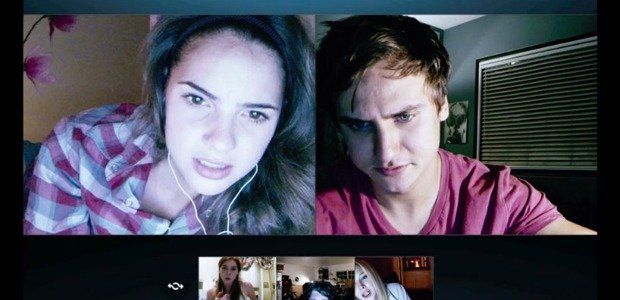One thing that the ultimately mundane Unfriended can be proud of is that it should have been a resolute failure.
Why? Well, not only does it unfold entirely across a computer screen (a gimmick that immediately sounds banal), but it also embraces the likes of Skype, Facebook, iMessage, and YouTube (each of which we all probably use way too much already) to tell its tale, and is filled with utterly spoiled and loathsome characters who are experts at a modern-day lexicon that has bastardized the English language.
Surprisingly, for a short while at least, each of these annoying characters actually bounce off of each other in an engaging manner, and you slowly find yourself being pulled into this cyber world because of its beguiling realism. Unfortunately, Unfriended fails to build on its early triumphs, though, and its flat final act belies the word of mouth that has preceded it.
Unfriended’s solid reputation started to emerge back in July 2014 after it premiered at the Fantasia Festival, while its continued screenings on the festival circuit only enhanced its standing. It was no surprise when Universal Pictures decided to pick it up for a wide theatrical release, especially since this positivity was coupled with a premise that a teenage audience should find alluring.
Unfriended unfolds on the two-year anniversary of the death of poor Laura Barns, a high school girl who committed suicide after being repeatedly ridiculed by her classmates over a video of her passed out a party. Six classmates who were particularly cruel to Laura after the release of the video gather together on the anniversary for their nightly ritual of talking on Skype. However, when a seventh person arrives to speak to them using Laura’s old Skype account, things go from spooky to terrifying in an instant, and the half a dozen bullies are soon scrambling to survive.
Knowing full well what the film’s selling point is, director Levan Gabriadze wholly embraces Unfriended’s modern cyber gimmick, never deviating away from Blaire Lily’s (Shelley Hennig) screen and instead fitting horror tropes around his unique approach. Apple wait icons build suspense, the clang of a sudden Facebook notification jars, the Skype ringtone haunts with each loop, and the tight confines of the computer screen become claustrophobic.
Because of this technique, Unfriended unfolds like a play, especially since the “set” only changes for the opening of new websites and software. Meanwhile, the young cast are impressively able to project their increasing terror despite the fact that the camera is never more than an inch away from their faces. All of which is compelling during the film’s opening, but this gimmick soon proves restrictive and even though Unfriended flirts with being intriguing and does shock as it unfolds it ultimately stalls with tedium.
Unfriended’s stale script also hampers its progress. While Gabiradze is able to build suspense and bring fluidity to Unfriended despite his motionless characters, the script never builds upon the original curiosity that its supernatural premise has outlined. The stakes plateau and Unfrended’s limitations soon come to the fore, while the convoluted wails of terror from the characters stops any eligible dread from building.
A more refined screenplay could have turned Unfriended into a more complete effort. Its exploration of online bullying, how it can build and the very real repercussions that it can have on youngsters all simmers in the background but soon becomes an afterthought.
Exasperatingly, Unfriended ultimately boils down to a drinking game, which lazily brings out a cavalcade of clichéd revelations that drive apart the group of friends and then whittles them down before ending with a damp squib of a finale. But by that point you’ll have long given up hope on Unfriended, and you’ll just be relieved that its conclusion has arrived in a timely manner.












